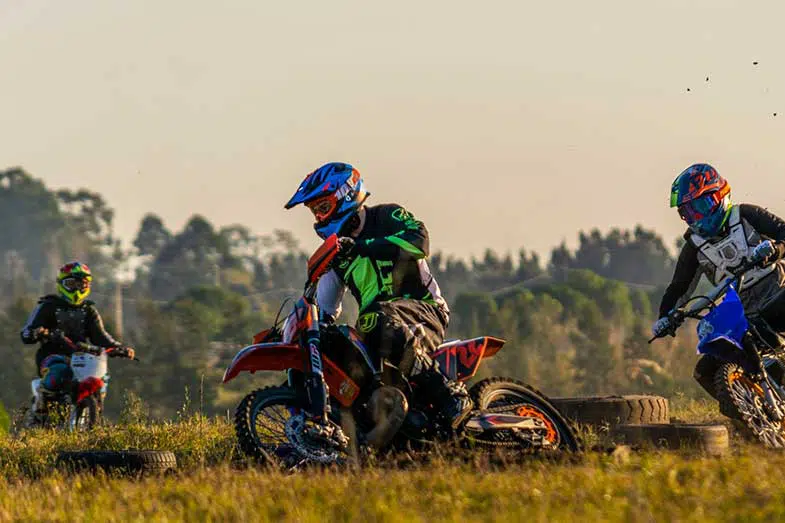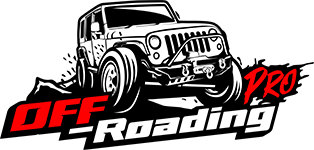Like a 4×4 ATV, dirt bikes have features that make them a safe choice for off-road or all-terrain riding adventures. Similar to any motor vehicle, though, you might not be able to drive or ride it without a driver’s license or even a dirt bike license plate, registration, or permit. There are certain state and federal laws and requirements that you need to meet and understand.
So, do you need a license for a dirt bike? Generally, you won’t need a driver’s license to drive a dirt bike on most private lands, but you would usually need one when driving on public roads. Your dual or dirt bike also needs to have particular features and a license plate before you can use it.
Keep in mind that some dirt bike laws in Florida won’t be similar to dirt bike laws in NC or dirt bike laws in Texas and other states. Since we can’t discuss them all here, we’ll focus on the different properties where you can generally ride your dirt bike without a driver’s license. We’ll also look into the requirements you need to meet to drive your motorbike on public highways, even if you have your driver’s license.
Where Can You Drive Your Bike Without a Dirt Bike License?

The answer to, “Do you need a license to drive a dirt bike?” depends. As such, below are specific places where you can ride or drive your off-road motorcycle.
Private Property
Some of us have a wide outdoor space or backyard where we can drive our dirt bike without any driver’s license. You can also use it in your neighbor’s private backyard, as long as you have the owner’s permission.
On that note and as mentioned, keep in mind that dirt bike laws in NC and dirt bike laws in other states vary. Thus, you must always ensure you check your own state or locality’s regulations or laws.
Local State Riding Parks or Trails
Your local state has riding parks or trails that will let you and your friends or family ride and drive your dirt bike to your heart’s content. However, Texas’ best dirt bike trails will have a similar or different set of requirements with another state. Some parks will even require you to pay a membership registration or fee.
With that in mind, here are some of the most common requirements in the majority of local riding parks:
- DNR or registration sticker
- Maximum sound or decibel level
- Protective gear
- Spark arrestor
- Parent’s or guardian’s waiver for young riders below 18 years old
Motocross Tracks
Your state will usually have public motocross tracks that you can book, but they may also have particular requirements that you need to meet. Apart from local motocross tracks, you might also have a neighbor with a private motocross track that you can use when the owner permits you to.
Since there are USA-made motocross dirt bikes specific for young riders, these tracks are among the best places where you can enjoy with your kid who shares the same interest as yours. Just make sure you choose tracks with lesser obstacles if you or your kid are just starting to learn how to motocross.

Desert and Forest Trails, Mountain Roads, and Dunes
Some states would have public lands where you can see an Off-Highway Vehicle (OHV) sign or something similar. This denotes that you can ride or drive your off-road bike without a driver’s license. These areas include forests, deserts, mountain roads, and dunes or beaches approved and regularly monitored by the BRL or Bureau of Land Management.
The great thing about these areas is that they have natural obstacles such as fallen logs and huge boulders. They also have varying and challenging terrains like creeks and loam that will make your ride more fun and adventurous.
Another positive is that you can ride your bike as long and as fast as you want. One thing to note is to check local regulations to ensure you have the required permit, pass, or dirt bike features.
Far-Off Rural Areas
As industrialized as the USA might be, the country still has rural areas with great landscapes where you can enjoy recreational dirt bike rides. You can try to find far-flung or resident-free areas in your locality where you can legally ride your dirt bike without any driver’s license.
Can You Ride Dirt Bikes in Residential Areas?
As noted, you can’t legally drive your dirt bike just anywhere within your county or state. In terms of residential areas or your neighborhood, some states will let you drive your dirt bike as long as you have the right driver’s license.
Even so, you need to make sure your dirt bike is street legal or ensure that it meets the federal minimum requirements. That is because neighborhood roads are considered public highways.
Requirements To Make a Dirt Bike Street Legal or Dual Type
Here are some dirt bike features that can allow you to drive your dirt bike on public roads:
Headlight
Your dirt bike must have a functional, DOT-approved headlight with both low- and high-beam capabilities. Some states might not require the high-beam functionality, but it’s a good feature for safety.
Other things to keep in mind are the accessibility of the high-beam indicator’s switch and visibility while you’re seated and driving. Regarding the headlight’s power source, you can either opt for a battery-powered headlight or simply hook it up to your bike’s rear brake.
Tail Light
Apart from being DOT-approved, your tail light must also come with a brake light feature or one that lights up once you hit the brakes. Another mandate is the tail-brake light’s power source, or the battery should have the capacity to energize it for at least 20 minutes. With that in mind, many experts recommend LED-type lights since they don’t consume too much battery power.
Turn Signals
Contrary to the add-on headlight, not all states require the installation of DOT-approved turn indicators or signals. Depending on your locality, your dirt bike must have both rear and front turn signals.
Where you need to install them in relation to the tail light and headlight will also differ from state to state. Generally, though, the switch’s required position is on the left-hand grip visible to you while you’re seated or driving.
Side-View Mirror
Since you’ll ride your bike in an area with people and other vehicles around, one requirement to get a street-legal dirt bike license or license plate is a wide-angle rear- or side-view mirror. You can install one or two, depending on the specific guidelines in your locality.
Either way, make sure you place them where you can clearly see anything behind you while driving. Some dual-type sportbikes already have street-legal mirrors. If not, you can simply clamp a bar-end side- or rear-view mirror.
Horn
One of the similarities between dirt bike laws in Florida and other states is the necessity for a horn. This is to ensure your own safety and the safety of the cars and individuals around the area. You can find manual and electrical models, but the latter is a better option because it’s louder.
Tachometer or Speedometer
Although not required in most states, how fast and slow you drive on public roads is vital for safety. After all, they’re easy to install. Additionally, some products have other useful features such as GPS and compass that you can also use off-road.
Exhaust
Since all states require that every vehicle has an exhaust that doesn’t produce too much smoke, installing an EPA-certified exhaust is the best move. If your dirt bike already has one, all you can do is replace the silencer with a slip-on spark arrestor.
Tires
Your dirt bike will most likely have tires meant for off-road terrains only, so they won’t be safe when used on-road or on highways. A majority of these tires also don’t have DOT’s approval.
It goes without saying that it should have DOT-approved tires for your dirt bike to be street legal or for it to become a dual sports bike. You may also have your dirt bike’s tires checked to see if they can pass their requirements.
Decal, Certificate, and Registration
Another necessity for a street-legal dirt bike is an OHV decal that you can get from DMV. Additionally, you need to get an inspection certificate that signifies your bike is street legal, which you would need to have your dirt bike registered or licensed.
License Plate Mount or Bracket
Most state laws and regulations, such as dirt bike laws in Texas, necessitates you to have your off-road motorcycle inspected and registered. You also need to make sure the license plate is visible. If your bike doesn’t have a dirt bike license plate mount or bracket, you would need to purchase and install one. Just ensure you check your localities guidelines on how to display your dirt bike’s license plate.
How Old Do You Have To Be To Get a Dirt Bike License?
If you plan to engage your kids in motocross or dirt-bike riding adventures or they’re interested in this activity, you must make sure they have the right license. The minimum age requirement for most states is between 16 and 17 years old. If they’re under the minimum age requirement, they would need to get an instruction permit and be supervised by a licensed rider before operating a dirt bike.
Do You Need a License for a Dirt Bike: The Conclusion
Overall, the need for a driver’s or motorcycle operator’s license would depend on where you plan to ride or drive your dirt bike. That works both for young and adult riders.
Generally, the answer to “Do you need a license to drive a dirt bike on the street and your neighborhood?” is yes because your dual-type sports bike or dirt bike needs to have the right features. This ensures the safety of everyone and everything around the area, including yourself. You also need a license if you would need to drive your dirt bike on public roads on your way to the riding areas that don’t require your driver’s license.
On the other hand, the answer to “Do you need a license to ride a dirt bike on private properties, off-road trails, motocross tracks, far-flung rural areas, and riding parks?” is a no. Just make sure you also meet any regulations or guidelines.
Whether driving on- or off-road, you would need to have your dirt bike licensed or registered. Since requirements vary from state to state, always check DMV’s website. The same goes for you and your kid’s driver’s license.
Lastly, the pieces of information provided in this article apply to some states and don’t to others. Therefore, always check your state’s specific dirt-bike riding laws.
Kris is an avid off-roader and outdoor enthusiast who loves to brave the elements and take on challenging terrain. He also enjoys sharing his passion and knowledge with others so that they, too, can appreciate the ride.
About Kris
